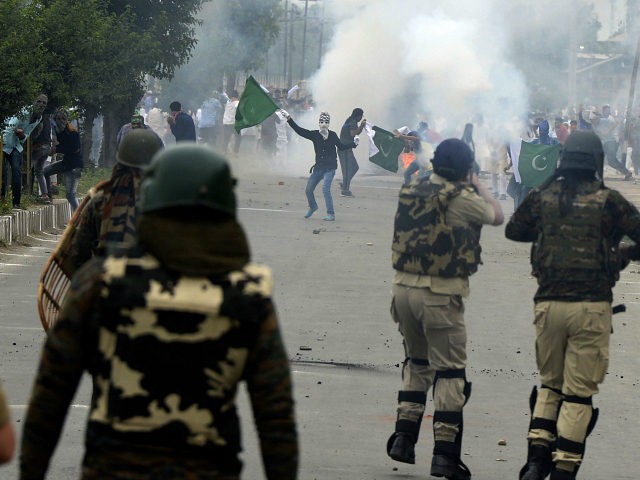Violent protests erupted in the India-held Kashmir region during the last week of Ramadan holiday, culminating in violent demonstrations after the Eid prayers marking the end of the Muslim holy month. Indian media reported at least ten injuries.
The Kashmir region has seen varying levels of unrest for over twenty years, as both India and Pakistan lay claim to the region. Kashmiri separatists – largely Muslim but not universally eager to be annexed by Pakistan – have clashed with Indian security forces with renewed vigor since last summer, when over 120 deaths were reported during exceptionally violent clashes between street protesters and Indian troops.
Australia’s ABC News observes that separatist protests in Kashmir are skewing increasingly young, with high-school and college students, many of them women, involved in numerous stone-throwing incidents against security personnel. Their comments to the media convey the frustration of living their entire lives in the perpetually restless province.
“All our lives we have seen death and destruction. I can’t take this anymore,” one college student told ABC. Another demonstrator, a young woman, spoke of organizing her friends to resist police operations on campuses.
Ominously, ABC describes these young protesters as “not scared and willing to die” because they are “completely alienated and have nothing to lose.”
Indian security agencies released a report on Monday which concluded student protest organizations, including groups banned by the government, used social media to mobilize thousands of young people for violent protests when security forces visited a college campus near the Kashmiri capital of Srinagar in April.
Indian authorities essentially accused the student groups of spreading disinformation online, including a false claim that the officers visiting Pulwama’s Government Degree College were there to make arrests, rather than merely attending a meeting with school administrators. In the Indian version of the incident, the student groups repeatedly used online broadcasts to escalate confrontations until they culminated in volleys of rocks and tear gas. The student groups were also accused of forging alliances with militant separatist groups.
On Thursday, a Muslim mob beat a police officer named Mohammad Ayub Pandith to death outside their mosque in Srinagar. The victim, a deputy superintendent of the state police, was in plainclothes taking photos of the mosque with his cell phone during late-night holiday prayers when he was confronted by worshipers and accused of spying. Ironically, he had been posted at the mosque to make certain the prayer services were conducted peacefully.
“Mob violence and public lynching is outside the parameters of our values and religion. We cannot allow state brutality to snatch our humanity and values,” said the chief imam of Kashmir, Mirwaiz Umar Farooq, in a statement condemning both sides of violence in the region.
The Indian Army knew it needed to improve its image with Kashmiris, so troopers handed out sweets to Muslims celebrating Eid. The troops were simultaneously instructed to steer clear of Eid prayer ceremonies, to avoid incidents like the one in Srinagar. Some of the fieriest pro-independence Kashmiri leaders were detained in an effort to avoid trouble. One of them was Mirwaiz Umar Farooq, the above-mentioned head cleric of Kashmir, who complained that he has been prevented from leading Eid services for eight years in a row by the “shameless and cowardly government.”
Violence nevertheless ensued at protests across the region, with clashes in several cities sparked by young people throwing stones at security forces. On the other hand, some observers accused the police of initiating violence by firing tear gas at peaceful demonstrators.
Ramadan gatherings are not the only factor in making June especially tense for Kashmir. July 8th is the anniversary of the death of Burhan Wani, a charismatic 22-year-old militant separatist whose social-media savvy made him highly influential with Kashmiri youth.
Wani, who commanded an insurgent group called the Hizbul Mujahadeen, was killed by police in an operation that actually targeted a different insurgent leader. India accuses Kashmiri separatists of glorifying Wani as a martyr. Indian authorities are so concerned about the unrest that might ensue on the anniversary of his death that government employees were directed not to mention his name in official correspondence.
Unmoved by India’s accusations, Kashmiri rebel groups plowed ahead with their plans to glorify Wani as a martyr, announcing on Monday the launch of a week-long commemoration of his death.
Iran is also stirring the pot in Kashmir, even though Kashmiri Muslims are predominantly Sunni. Supreme Leader Ayatollah Ali Khamenei lumped Kashmir in with Yemen and Bahrain as regions where the Muslim world should “repudiate oppressors and tyrants who attacked people in Ramadan,” in a statement made during Eid prayers.
“Islamic Nations are covered in wounds: Conflicts in Yemen, Bahrain, problems in all Islamic countries, are major wounds on the body of Islam,” said Khamenei. “The world of Islam should explicitly support the people of Yemen, and express their disdain against the oppressors who’ve attacked the people in such horrible ways during the month of Ramadan.”
“The same is true for the people of Bahrain and Kashmir: Our people can back this great movement within the World of Islam,” Khamenei continued. “Just as we explicitly express our position against enemies and adversaries, the world of Islam – especially the elites in it – should follow this path and take a position towards seeking to please God, absolutely, even if it leads to dissatisfaction of the arrogant front.”

COMMENTS
Please let us know if you're having issues with commenting.